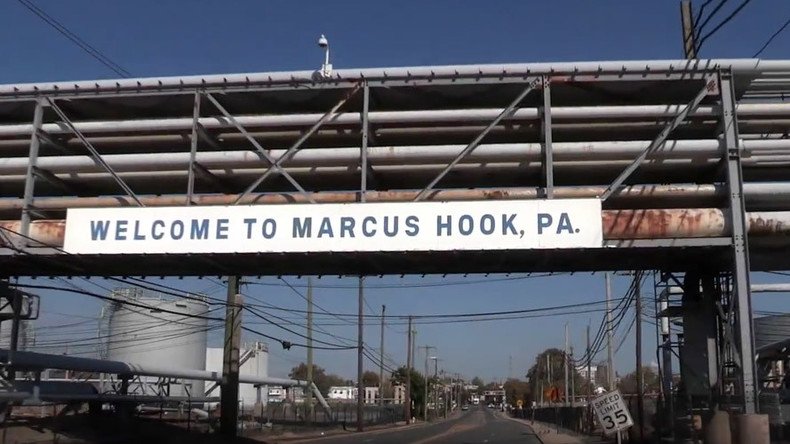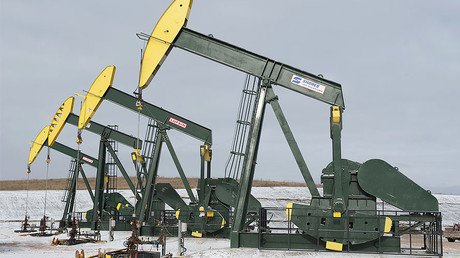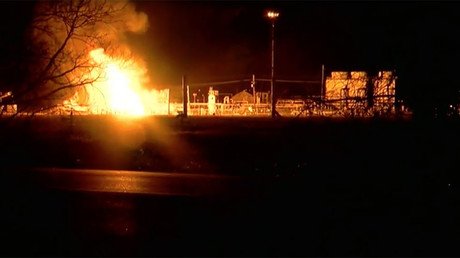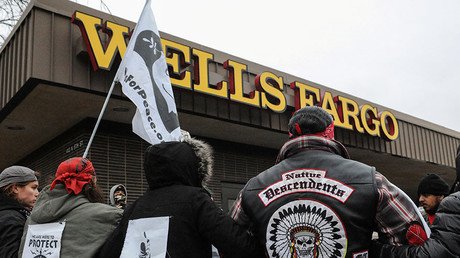Pipeline to move fracked gas across Pennsylvania as critics cry foul

A subsidiary of the company responsible for the Dakota Access Pipeline has begun construction on a pipeline that will move as much as 700,000 barrels of liquid natural gas across Pennsylvania. Local groups are concerned about the project's safety.
Just hours after Sunoco Logistics' two pipelines - known as the Mariner East 2 pipeline project - received permits from the Pennsylvania Department of Environmental Protection (DEP), construction crews began work on the 350-mile line system, according to the Times Herald.
The 20-inch Mariner East 2 and the 16-inch Mariner East 2X pipelines will move flammable natural gas fluids – including propane, butane, and ethane – extracted from the Marcellus and Utica shale wells in Ohio, Pennsylvania, and West Virginia to the Marcus Hook Industrial Complex along the Delaware River in southeast Pennsylvania. The combined initial capacity for the two lines will be 275,000 and 250,000 barrels of liquid per day, respectively. The capacity of the larger Mariner East 2 could reach 450,000 barrels per day, according to reports.
Safety of laying pipeline across state questioned https://t.co/mVYE27ooWQpic.twitter.com/iVo4wfN9Y5
— TribLIVE.com (@TribLIVE) February 27, 2017
The Mariner East 2 project will use the horizontal directional drilling technique to install piping between 20 and 180 feet underground, according to the the Times Herald.
The project's path will cross more than 2,000 streams, wetlands, paved roads and railways across Pennsylvania, the Tribune-Review reported. In response to the project, which has been in the works for roughly two and a half year, ecological advocacy groups have pushed the state to hold Sunoco to a rigorous standard of environmental stewardship, but to no avail, they have said.
Prior to the state DEP's final approval of the Mariner East 2 project, environmental advocacy groups had appealed the issuance of permits, saying the DEP had failed to consider the negative effects of the pipelines. The groups – including the Clean Air Council, the Mountain Watershed Association and the Delaware River Waterkeeper – said citizens along the Mariner East 2 route have flagged "additional discrepancies" in Sunoco's latest permit requests, and that the company's applications are "both incomplete and full of critical errors."
Late last week, Judge Bernard A. Labuskes Jr., of the Pennsylvania Environmental Hearing Board, rejected the groups' request for an order to reject the DEP-approved permits and halt the project's construction, according to the Tribune-Review. On Wednesday, March 1, Labuskes will hear arguments from the groups regarding the fairness of the DEP review process.
Environmental advocates are demanding an immediate stop to construction and are calling for a reevaluation, if not a wholesale rejection, of Sunoco's latest permit application.
Mariner East 2 is an expansion upon the capabilities of the Mariner East 1 pipeline, another Sunoco pipeline project, which runs from Houston, Pennsylvania, to the Marcus Hook terminal. The Mariner East 2 follows the same path, but will go farther west to Scio, Ohio.
Sunoco is a subsidiary of Energy Transfer Partners, the company responsible for the highly-contentious Dakota Access Pipeline that is planned to transport 470,000 barrels of crude oil per day from North Dakota's Bakken shale fields to Illinois. The Dakota Access Pipeline has incurred months-long protests originally led by the Standing Rock Sioux Tribe and set up along the Dakota Access Pipeline's route, near the confluence of the Missouri and Cannonball rivers. Late last week, protesters camped at the Oceti Sakowin camp were either forced to evacuate or were arrested upon orders from local law enforcement.
Sunoco CEO Michael Hennigan said the Mariner East 2 project came about based on increased demand for pipeline capacity.
"Receipt of the [Pennsylvania] DEP permit has been a key factor in the discussions to date," said Hennigan, according to the Times Herald. "One of the things that we have been doing is continuing to market additional commercial contracts, and we’ve received enough commitments to move forward with two pipelines."
The environmental groups said in a statement that the DEP's final decision on the project permits were made "too hastily and will allow Sunoco Logistics to violate the law."
"Sunoco’s permit applications were woefully incomplete, inaccurate, and contradictory, and DEP’s review and approval was utterly inadequate," said Joseph O. Minott, executive director and chief counsel of Clean Air Council. "What DEP has authorized with these permits is the destruction of Pennsylvania streams and wetlands, the endangerment of the public, and great damage to both public and private property."
Pennsylvania officials "are once again betraying this obligation and the public trust in favor of aiding the fracked gas and fossil fuel industries in achieving their corporate goals," said Maya van Rossum, of the Delaware Riverkeeper Network. "Environmental groups now have to step in and do the government’s job for them."
Agents working with Sunoco have negotiated and secured right-of-way easements with private landowners, said Sunoco communications manager Jeff Shields, according to the Times Herald.
"We are also notifying township officials, though not specifically adjacent landowners," he said.
Sunoco says the project will be complete by the third quarter of 2017.

















